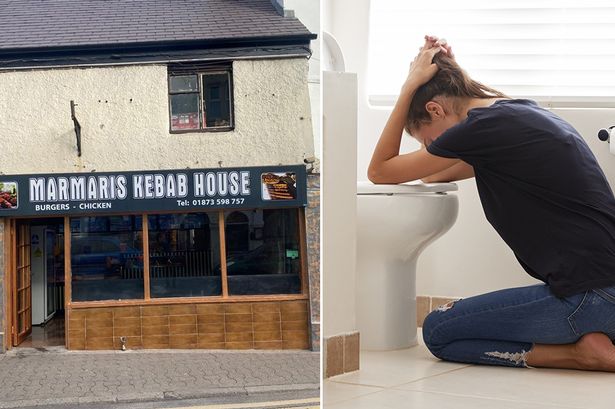The tranquil market town of Abergavenny in Wales, nestled amidst the rolling hills of Monmouthshire, found itself at the centre of a disturbing food safety incident in late 2022. What began as a trickle of complaints about stomach upsets from patrons of the Marmaris Kebab House, a popular local takeaway, rapidly escalated into a full-blown public health crisis. Scores of customers reported experiencing a range of debilitating gastrointestinal symptoms, including severe vomiting, diarrhoea, and abdominal cramps, following consumption of food purchased from the establishment. The sudden surge in illness prompted a swift response from environmental health officers at Monmouthshire County Council, triggering a comprehensive investigation into the potential source of the contamination. The incident sparked alarm within the community, raising concerns about the safety of local food establishments and the potential for wider public health repercussions.
As the investigation unfolded, environmental health officers meticulously examined the Marmaris Kebab House’s premises, scrutinizing food handling practices, hygiene protocols, and storage procedures. Their detailed inspection revealed a catalogue of alarming deficiencies that pointed to a significant breakdown in food safety management. The investigation uncovered critical failures in temperature control, with food being stored at unsafe temperatures, creating a breeding ground for harmful bacteria. Cross-contamination risks were also identified, with raw and cooked foods stored in close proximity, increasing the likelihood of pathogenic transfer. Furthermore, the inspectors noted a lack of adequate handwashing facilities and insufficient staff training in basic food hygiene principles. These cumulative failings painted a picture of systemic negligence, ultimately contributing to the widespread outbreak of foodborne illness amongst the takeaway’s customers.
The evidence gathered by the environmental health officers painted a stark picture of inadequate food safety practices at Marmaris Kebab House. They discovered that doner kebab meat was not being cooked to the required internal temperature, posing a significant risk of harbouring harmful bacteria such as Salmonella and E. coli. Refrigeration units were found to be malfunctioning, leading to improper storage temperatures that facilitated bacterial growth. Furthermore, the premises themselves were found to be in a generally unsanitary condition, with inadequate cleaning and disinfection practices exacerbating the risk of contamination. The overall picture presented by the investigation was one of gross negligence in upholding basic food hygiene standards, creating an environment ripe for the proliferation of foodborne pathogens.
The findings of the investigation culminated in legal action against the owner of Marmaris Kebab House, Mehmet Tekin. He appeared before Newport Magistrates’ Court charged with multiple offences under the Food Safety and Hygiene (Wales) Regulations 2013. The court heard a detailed account of the investigation’s findings, including the extent of the customer complaints, the severity of the illnesses reported, and the numerous food safety breaches identified at the premises. Tekin pleaded guilty to the charges, acknowledging his failure to maintain adequate hygiene standards and prevent the contamination incident. The court, recognizing the seriousness of the offences and the potential for significant harm to public health, imposed a hefty fine of £10,000, along with additional costs.
The hefty fine imposed on Marmaris Kebab House owner, Mehmet Tekin served as a stark reminder of the legal and financial ramifications of failing to comply with food safety regulations. Beyond the immediate financial penalty, the incident undoubtedly damaged the reputation of the establishment, eroding public trust and potentially impacting its long-term viability. The case underscores the crucial importance of adhering to stringent food safety protocols in the food service industry, not only to protect public health but also to safeguard businesses from legal and reputational damage. It highlighted the need for robust training and oversight within food establishments to ensure that all staff members understand and adhere to proper hygiene practices.
The Marmaris Kebab House incident served as a wake-up call for the local community and the wider food industry in Wales. It underscored the vital role of regulatory bodies like Monmouthshire County Council in upholding food safety standards and protecting public health. The case also highlighted the importance of consumer vigilance in reporting foodborne illnesses, as this early reporting played a crucial role in triggering the prompt investigation and preventing further spread of the contamination. The incident served as a stark reminder that food safety is a shared responsibility, requiring diligence from businesses, regulatory authorities, and consumers alike to ensure the safety and well-being of the community. The significant fine imposed on the establishment owner underscores the seriousness with which food safety breaches are viewed, sending a clear message that negligence in this area will not be tolerated.














